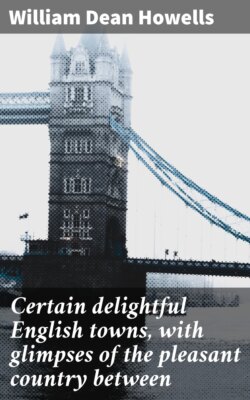Certain delightful English towns, with glimpses of the pleasant country between

Реклама. ООО «ЛитРес», ИНН: 7719571260.
Оглавление
William Dean Howells. Certain delightful English towns, with glimpses of the pleasant country between
Certain delightful English towns, with glimpses of the pleasant country between
Table of Contents
ILLUSTRATIONS
CERTAIN DELIGHTFUL ENGLISH TOWNS CERTAIN DELIGHTFUL ENGLISH. TOWNS
I. THE LANDING OF A PILGRIM AT PLYMOUTH
II. TWENTY-FOUR HOURS AT EXETER
III. A FORTNIGHT IN BATH
IV. A COUNTRY TOWN AND A COUNTRY HOUSE
V. AFTERNOONS IN WELLS AND BRISTOL
VI. BY WAY OF SOUTHAMPTON TO LONDON
VII. IN FOLKESTONE OUT OF SEASON
VIII. KENTISH NEIGHBORHOODS, INCLUDING CANTERBURY
IX. OXFORD
X. THE CHARM OF CHESTER
XI. MALVERN AMONG HER HILLS
XII. SHREWSBURY BY WAY OF WORCESTER AND HEREFORD
XIII. NORTHAMPTON AND THE WASHINGTON COUNTRY
Отрывок из книги
William Dean Howells
Published by Good Press, 2022
.....
I will not pretend that I was intimately acquainted with her history before I came to Exeter. I will frankly own that I did not drive up to the Butt of Malmsey in the hotel omnibus quite aware that the castle of Exeter was built on an old British earthwork; or that many coins, vases, and burial-urns dug up from such streets as I passed through prove the chief town of Devonshire to have been built on an important Roman station. To me it did not at once show its Romano-British origin in the central crossing of its principal streets at right angles; but the better-informed reader will recall without an effort that the place was never wholly deserted during the darkest hours of the Saxon conquest. The great Alfred drove the Danes out of it in 877, and fortified and beautified it, and Athelstan, when he came to Exeter in 926, discovered Briton and Saxon living there on terms of perfect amity and equality. Together they must have manned the walls in resisting the Northmen, and they probably united in surrendering the city to William the Conqueror after a siege of eighteen days, which was long for an English town to hold out against him. He then built the castle of Rougemont, of which a substantial ruin yet remains for the pleasure of such travellers as do not find it closed for repairs; and the city held for Matilda in the wars of 1137, but it was finally taken by King Stephen. In 1469 it was for the Red Rose against the White when the houses of Lancaster and York disputed its possession, and for the Old Religion against the New in the time of Henry VIII.’s high-handed reforms, when the Devonshire and Cornish men fought for the ancient faith within its walls against his forces without. The pretender Perkin Warbeck (a beautiful name, I always think, like a bird-note, and worthy a truer prince) had vainly besieged it in 1549; and in the Civil War it was taken and retaken by King and Parliament. At some moment before these vicissitudes, Charles’s hapless daughter Henrietta, who became Madame of France, was born in Exeter; and in Exeter likewise was born that General Monk who brought the Stuarts back after Cromwell’s death.
The Butt of Malmsey had advertised itself as the only hotel in the cathedral close, and as we had stopped at Exeter for the cathedral’s sake we fell a willing prey to the fanciful statement. There is of course no hotel in the cathedral close, but the Butt of Malmsey is so close to the cathedral that it may have unintentionally confused the words. At any rate, it stood facing the side of the beautiful pile and getting its noble Norman towers against a sky, which we would not have had other than a broken gray, above the tops of trees where one nesting rook the less would have been an incalculable loss. One of the rooms which the managers could give us looked on this lovely sight, and if the other looked into a dim court, why, all the rooms in a cathedral close, or close to a cathedral, cannot command views of it.
.....